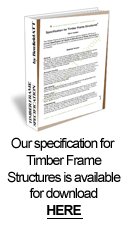Fire Performance of Timber Frame
Researched, Tested & Proven
Because some people were concerned about how a timber framed building would perform if a fire occurred, the UK’s Building Research establishment tested this as part of the same Cardington experiment referred to above. The fact was that the scientists carrying out these tests had to go to considerable lengths to get a fire to take hold in the flat where this was deliberately set. BRE have subsequently confirmed this and refuted ‘fears’ allegedly promoted by brick, block and concrete sector interests (See BRE responds to FIRE ALARM).
Recent Fires and Timber Frame
Press reports of timber frame blocks of flats and similar complex buildings ‘going up in smoke’, have all played to the sensationalist gallery. So let’s put the record straight.
- All these occurred in buildings where only the skeleton framework was built.
- Subsequent investigation found all such fires to be deliberate arson attacks.
- The Building Regulations require Timber Framed structures to meet the same exacting standards for fire performance as any other building system.
- National Insurers make no distinction between modern timber framed buildings and any other form of construction. Timber frame buildings are usually lined with plasterboard or other fire resistant materials which protect the structural elements.
- Timber ‘charring’ protects it from burning (see below)
Timber Buildings Perform Best in Fires
It is not easy to set light to timber.
Anyone who has ‘set’ a fire will know that small, thin pieces or paper, twigs and other ‘kindling’ are required to build up a heat mass before it will go. And to do this often requires ‘blowing’ on the base of the flames to provide greater amounts of oxygen to promote them.
It may even be necessary to use bellows or some means of drawing air into the fire to keep it going. This is usually an essential requirement if large logs are put on the fire. They may take on the outside for a short while, but then they go out.
Timber ‘Charring’ Prevents BurningThis is because timber ‘chars’ rather than burns. When the outer layer of the timber is set alight, it forms a ‘skin’ of charcoal around the underlying wood, preventing the oxygen essential for anything to ‘burn’ to get to this. Forest Fire ExamplesThis happens in the fierce and vast forest fires that occasionally occur in places like Australia, for example. Here one often finds that many of the trees are still standing after an inferno has blazed through them. After a while, they just begin to grow again. (see Ironbark) |
Fragile Masonry, Melting Steel
In concrete and masonry structures these materials heat up, expand, fracture, and spall away. The resultant weakening of structure can cause part or all of it to fall down. Likewise if steel or similar materials are used the heat of a fire in the building causes them to expand, soften and collapse.
Twin TowersThis is what happened on 11th September 2001, when the Twin Towers caught fire after the terrorist attack in New York. The heat simply caused the steel structure to heat up down the whole of its height, buckle and collapse with the loss of over 3,000 lives. |
Timber Survives
The photo below shown here illustrates how a large timber beam survived a fire, providing support for the reinforcing rods and girders used in its concrete and steel elements. These have simply heated, expanded, broken away, softened, and bent over this truly outstanding structural material.
Timber Beam Intact After Fire
If you have a particular question or problem we’ll be happy to answer it for you.
Just e-mail our Build Centre using our contact form







